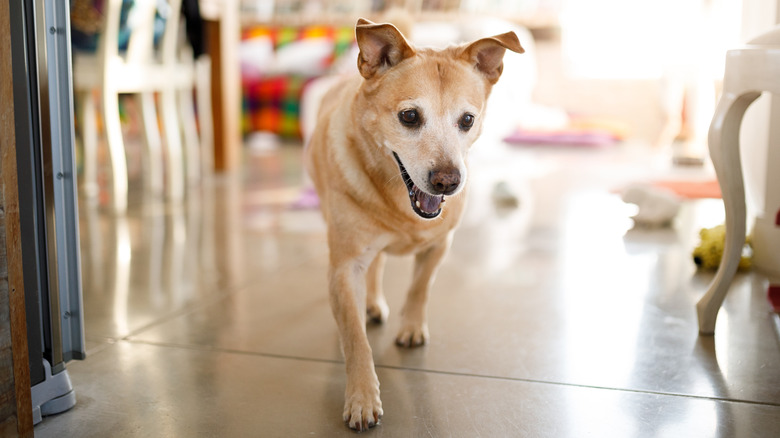What It Means When An Older Dog Walks In Circles (& Why You Shouldn't Ignore It)
Older dogs, with their frosty snouts and droopy jowls, are some of the cutest, most soulful pups on the planet. But it's true that with age often comes more health problems. And one behavior older canines can exhibit that could indicate an issue is walking in circles. Now, dogs of all ages pace in circles occasionally to settle themselves before lying down or when they get extra excited. But doing so in excess could be a sign of a neurological or a behavioral issue, especially in older pups.
Dementia is quite common, affecting up to 60% of older dogs, mostly over 11 years old, according to a 2013 study published in the Journal of Veterinary Internal Medicine, and walking in circles is one potential sign. OCD can also affect dogs and may make them compulsively spin around, sometimes chasing their tails.
Your older pup could also have an issue affecting their balance, such as vestibular disease. Vestibular disease impacts the system responsible for maintaining balance and can be caused by numerous health problems, like ear infections, injury, or tumors. In short, there are many reasons your older dog could suddenly walk in circles repeatedly, and they're not all necessarily life-threatening. Yet, most require medical attention, so you don't want to let the issue linger.
What to do if your dog is walking in circles
If you notice your dog walking in circles and they're not particularly excited or trying to get comfortable on their dog bed, it's definitely time to bring them to the vet for a consultation. Things like vestibular disease caused by ear infections are often treatable, but dementia is degenerative, so it's important to catch it early so you can help slow its progression. You don't want to wait before making that appointment — it's scary, but the more you know, and the earlier, the better.
If your dog is diagnosed with dementia, there are many steps you can take to make them feel as comfortable and safe as possible. Per Cornell's Richard P. Riney Canine Health Center, you can start by blocking off stairs and other potentially unsafe areas of your home, respecting their potentially shifting boundaries when it comes to socializing with others, taking measures to assist with their sleep by going on extra walks at night, and sticking to a consistent daily routine. Any measures you take to handle your pup's dementia should be done under the guidance of your vet.
What's the prognosis for a dog who walks in circles?
If diagnosed with vestibular disease due to an ear infection, your dog may be back to their old self in a matter of weeks with help of an antibiotic, or, in more severe cases, IV fluids and a hospital stay. For a behavioral issue like OCD, your vet could prescribe anti-anxiety medication and/or behavior modification exercises. Other conditions, like dementia or tumors, will have different treatment plans and prognoses — it varies from pet to pet, and their issue may require lifelong treatment.
Early intervention and consistent monitoring are the most important steps when caring for your older dog to maintain a good quality of life for as long as possible. Walking in circles can be a concerning behavior, especially in our beloved older canines, but there are a whole host of possible explanations. The most important thing is to get your pup seen by their vet as soon as possible so whatever the issue, you can begin treatment right away.


